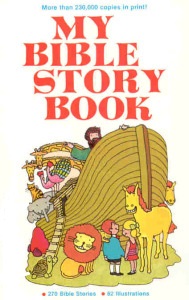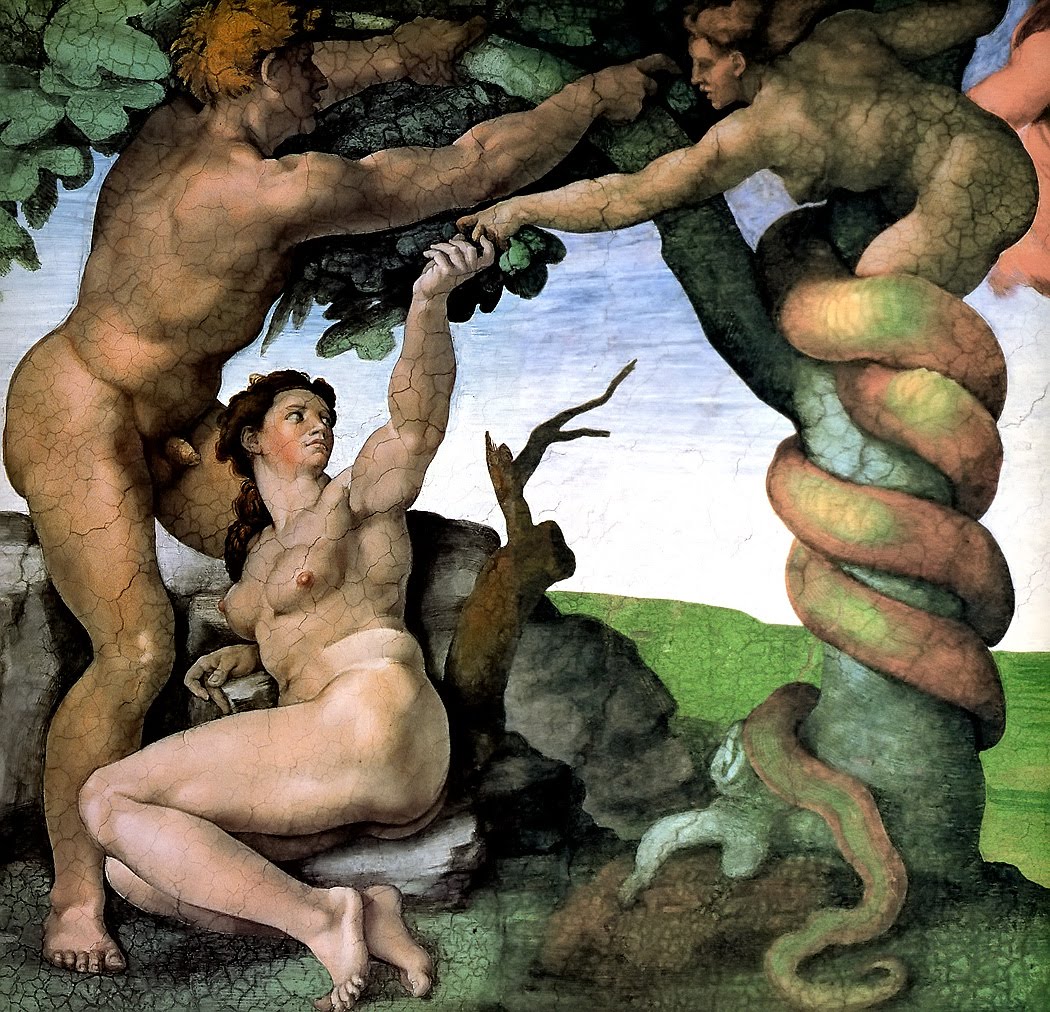 To read Genesis 3-4 you have to rid yourself of simplistic assumptions.
To read Genesis 3-4 you have to rid yourself of simplistic assumptions.
This is not a straightforward tale from a children’s picture book.
The author is actually trying to answer Ecclesiastes’ question:
“Consider the work of God; who can make straight what he has made crooked? (7:13)
She is trying to explain God’s actions, at the same time as human actions which interact with God’s actions.
So it gets complicated.
Other authors in the Old Testament showed little concern for this narrative; unlike for Christians, beginning with Paul, who made the figure of Adam pivotal. For the Hebrew writers it was Exodus which played the key role, not Genesis. They did not fossilize and absolutize the meaning of the Genesis text the way we did.
For example, should we not ask the question why did God put the forbidden tree in the middle of the garden in the first place (3:3)? He could hardly have made it more noticeable and intriguing! And if we say this was a test, why was a test needed at all? Adam and Eve were happy, they enjoyed God’s company, and presumably he enjoyed theirs. Unless perhaps he wanted something more from them?
Perhaps he wanted to offer them freedom, to see if they would love and obey him even when they were free?
And right there comes the first complication. How could God offer Adam and Eve freedom without making the possibility of disobedience absolutely real to them? A live option? In which case it was God himself who introduced knowledge of good and evil to humankind.
Our first parents acted on this knowledge, but it was there before them. You see what I mean? Adam and Eve had no cultural models. They were as fresh and innocent as dew on a buttercup. They were children who’d never had a candy, or seen T.V., or heard their parents quarreling. Their only model was God.
Or the serpent…
Whoa! A second complication! “Now the serpent was more crafty than any other beast of the field that the LORD God had made.” (Standard Version) The serpent or snake is compared to other animals–there is no hint of a supernatural being. If it was a supernatural being there would of course be no question of its intellectual ability or wits. So God made this creature along with the other animals and placed it in the garden. Where is the explanation of this particular creature’s presence, given its devious attitude? There is none.
We have to wait until the last book of the Christian bible, the Book of Revelation, to learn that the serpent is the same as “the devil”. There is a question of course about what the author of Revelation himself means in his context, but at the level of the story in Genesis, and its original meaning in the Hebrew setting, it is not useful at all to rush in and conclude we’re talking about an other-worldly master of evil somehow using the mouth of a snake to speak.
In other words, there is in the Genesis story a very strong implicit suggestion that it is God himself who introduced the snake into the mix, just as he set up the tree in the middle of the garden.
Furthermore, if we compare this story with the following one, of Cain and Abel, we see that there is a unique parallelism between these two stories (familiar conversation of God and humans, crime and punishment, curses etc.). And in both accounts God somehow digs the ditch which humans fall into (God “prefers” Abel’s sacrifice without any cogent explanation of why this should be the case).
To deny all this is to ignore the different levels of the text and interpret it in an extremely narrow legalistic sense. Those who did this in the Christian tradition, formulating the heavy-handed doctrine of “one original sin”, did so out of a culture of Roman law. These fathers of the church ignored, I think, or were insensitive to, the more feminine Wisdom framework of thought in the Old Testament. If we connect the Genesis story with this framework we get a much richer, more provocative account of the human problem and condition.
Wisdom writing is concerned with how human life might turn out well, with how it might be lived successfully. We know that the author of Genesis 3 had a wisdom perspective (3:6), so what if the overall story is not about figuring out one catastrophic original crime and its supernatural penalties, but a much more wide-ranging and daring discussion on the sources and meaning of our actual human alienation and suffering?
The root problem seems to be desire itself and the deadly competition and rivalry it leads to. The story tells that the first parents were not “made” with desire but desire emerged in the process of their becoming human. And God took a direct hand in this. The very set-up of the Garden of Eden has to be God’s education of the infant-like Adam and Eve. He was teaching them their humanity, the possibility of desire. The fact that they failed their exams does not negate the fact they were in school. And, despite failing, what they took away with them and would always remain with them was indeed desire. God awakened desire in them and God’s purpose was that they might desire God! They took the more glittering path of desiring “stuff”, the fruit of the tree. So then God took violent measures against them–he expelled them from the Garden. But that action by God is predicated on the kind of humans they had become–full of rivalry and violence! And as a result they got the kind of God they asked for–one who expels and likes blood sacrifice!
But the writer knew this could not be the end of the story. The picture of God she presents is ironic, unsatisfactory, unfathomable. There has to be more to come, a deeper design at work.
And so, yes, there is this verse. At 3:15 God addresses the snake, “I will put enmity between you and the woman, and between your offspring and hers; he will strike you head, and you will strike his heel.” Who is the woman? It can only be Wisdom; and her offspring will strike at the head of the snake, meaning they will reject the logic of violent desire which the snake had so eloquently expressed. And the snake will retaliate in the only manner it knows how.
What the author of this story is looking for is a way to deal with desire and violence and really she hasn’t the foggiest idea of what that could be in practice. BUT she does know the crucial questions to ask and she does so in a subtle, profound way. And it is this deep wisdom which also gives confidence to predict the coming of a human one who would reverse the logic of violent desire. The author knew that God created us with desire so that one day would also come its transformation.

Hi Anthony,
Any thoughts on desire as it is expressed in the Talent parable in Matthew? The third slave seems to be uninterested in competing with the two”successful” slaves. He seems to opt out of the rivalry that promises the reward of “entering into the joy of the master.” The God of his understanding is a fear producing figure who does not inspire desire to obey. Any thoughts?
Jesus uses one economy to talk about another. “Trading” in the Kingdom is of course something very different from trading in currency based in violence. It’s all to do with an open-hearted, generous response. As I have recently learned, Robert, Matthew’s parables of judgment always return to the auditor their own attitude: forgiveness and generosity, or resentment and violence. We are all called to give freely whatever we have, and naturally that kind of attitude will lead to a positive “trading up.” It’s a wisdom motif, and it’s pretty clearly addressed to Matthew’s church community. Blessings!
Tony: As always, your interpretation of the Bible is illuminating and appealing. However, I would add a further comment on the serpent. Given what we are learning now about the dynamics of mimesis and the complexities of the brain, specifically concerning the mirror neurons, I would say that the one secret that the writer of Genesis 3 couldn’t recognize is that we humans emerge from the womb potentially both for one another and against one another; there is a fine line between the two. The serpent is the embodiment of mimetic desire created in our (Adam’s and Eve’s) own imagination. But this creature of our own desire is sly and usually concealed, like a serpent. You say other authors of the Bible are not concerned with this narrative. Indeed, that is also true of Genesis 4, which proceeds as though the serpent doesn’t exist! Which it doesn’t; it’s greater power and potential curse of the emerging mind that can be for the other or against the other, a boundary being in the world of creatures! Peace & love, Jim
Thanks, Jim, for your comment. Yes, that is another angle on the interpretation of this key text. The writers could not have known in a scientific way about mimetic desire and so they gave its so-powerful effects a mythic rendering. A talking serpent! At the same time that reinforces my deeper point. God is ultimately responsible for creating us as mimetic beings, for “placing the serpent in the garden.” In which case it is impossible for the writer to fully account for God’s actions–s/he couldn’t know yet of a divine love that takes up the consequences of creation and leaves us a transforming example and pathway of love. Meanwhile the problem is stated as a problem. What the dominant tradition (Augustine et al.) did was to resolve the problem into blame, “original sin,” rather than remain at the level of desire (prior to sin) and then its transformative resolution. Peace and love indeed!